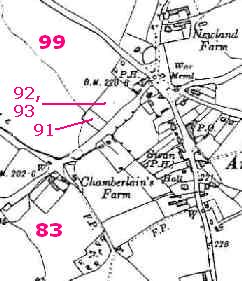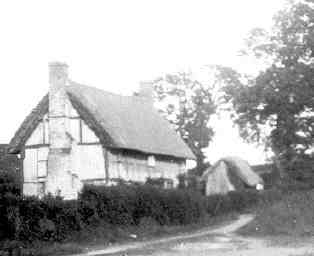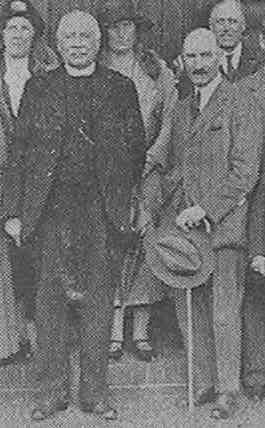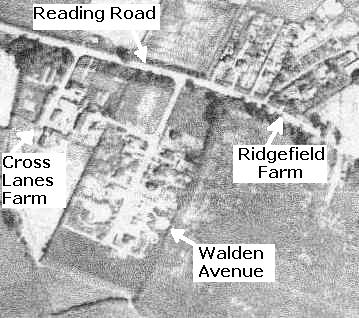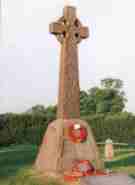
|
Arborfield
|
|
Memories
Related sites:
|
This is the ninth article for Arborfield in the Berkshire Local History Recording Scheme,
reference A6-9, recorded by Mr Burley Ridler, who lived at Woodhaven,
School Road, until the late 1940's, and by 1953 lived at 34, Alpine
Street, Reading. The type-written article had no
illustrations, but photos and maps have been added to this transcript: 'History of the village of Arborfield, 1938-1945' Throughout 1938 the unsettled
state of international affairs was reflected in village life. As early as April
the Parish Council appealed for A.R.P. volunteers. By the autumn there were 25
wardens, including the 72 year old Rector, Canon J.A. Anderson, and in September
they organised an emergency distribution of gas masks from the Village Hall at
the time of the Munich crisis. Also this winter an anti-gas course was held. In
October special thanksgiving prayers for the Munich settlement were read in the
church. In December a discussion on National Service took place at the British
Legion hut. War preparations apart, normal village activities continued: the
school children staged an Empire Day pageant, and held their usual summer
sports; the British Legion held a social and a dug-out supper; the annual
parochial church council was followed by a social at which a presentation was
made to Mr T.H. Allen, organist for 25 years, and his successor Mr G. St. Clare
Collis was welcomed. There was also a summer meeting and sale at Arborfield
Rectory.
Two activities which failed to survive the war were the cricket matches held at “Newlands” and the Bellringers’ supper at the Mole Inn. Also up to the outbreak of war the handbell ringers visited houses in the village during Christmas week. Two matters discussed by the Parish Council and still unsettled in 1953 were the provision of a village playing field, and an electricity supply.
1939 opened with continued preparations for a possible emergency. In January wardens who had completed their course received badges and certificates. Mr A.J. Bentley became assistant head warden, and it was stated that out of 25 wardens, 23 were women. By the early summer an advance party of
army men arrived and set up tents in a field to the In July the first batch of militia men arrived, 1000 in all, and they were accommodated in tents in a field west of Wokingham Lane (Whitehall Farm). By the autumn, huts were ready for the second batch of recruits. Four years later the vast R.E.M.E. headquarters was set up on land east of the main Eversley Road, on the old Remount Depot land. On the outbreak of war a number of Territorials were called up and the Observer Corps manned their post on the hill beyond Arborfield Court (O.S. 43, sheet xlvi.i). Many of the observers were special constables who had already taken an anti-gas course. There were 16 men on the strength, including two regulars, Major H.S. Morris and Mr W.T. Cox. The A.R.P. organisation was centred on Ridgefield (Mr and Mrs Capper) but apart from a two hour alert on September 6th the winter was quiet. At the October meeting of the British Legion it was stated that 16 members had joined the Royal Observer Corps, 2 were on active service, and a number of sons and daughters of members had volunteered; in addition, the A.R.P. service was largely manned by members of the Women’s section. It was also reported that the Women’s section and the Church Army were jointly running a canteen at the Legion Hall. Decisions taken were to change from monthly to quarterly meetings and to devote profits from whist drives to a parcels scheme for serving soldiers. Although wardens had compiled a list of householders willing to receive children, at the last moment Arborfield was declared a non-evacuation area. Evening church services were held at the Village Hall because of its central position and better black-out facilities. A party of ladies met weekly at Arborfield Court (Mrs Prescott) to make garments for the Hospital Supply Depot. At a meeting of the Cricket Club held in November it was stated that the treasurer (W. Hayward) was on active service. An entertainment committee was formed to organise events to raise funds for men serving with the Colours. It was stated that it had not been possible to arrange fixtures for 1940. Normal village activities included an earlier meeting of the Cricket Club when Mr Verrall (schoolmaster) resigned as hon. secretary after 17 years of service. Mr Hylton Seymour (The Stores), secretary of the Hospital Contributory Scheme for 9 years, resigned, and was succeeded by Mr B. Ridler. The eighth and last annual dinner of Arborfield & District British Legion was held at the Village Hall in February. The usual school sports and prize-giving were held in the summer. At the annual meeting of the Parochial Church Council it was stated that the belfry had been repaired and that a new organ was urgently needed. The funeral took place in January of a former resident, Mrs Rickman, widow of Capt. Stuart Rickman. Occupiers of the Grange from 1889-1914, they long made it a habit of giving a red cloak to each schoolgirl, and a pair of boots to each boy, and a pound of tea to the aged each year. During the year Mrs Anderson, wife of the Rector, died. Usually dressed in black and a firm believer in the principle of Victorian benevolent visiting, her practical attitude particularly at home was a necessary complement to her husband’s somewhat abstracted manner. The Misses Hainworth, the Rector’s sisters-in-law came to live with him after his wife’s death. 1940. By now practically all village events were devoted to helping the war effort. At a whist drive in January organised to aid the gift parcels scheme it was stated that 50 men from the district had been sent parcels. A number of soldiers from Arborfield camp were prizewinners at this whist drive. This summer a Home Guard platoon was
formed under the command of Capt. Speller (The The British Legion announced in the autumn that 49 members had now undertaken national service. Owing to travelling difficulties, sub-sections were formed at Bearwood, Barkham and Newland. In the winter a ‘wool gathering’ and a whist drive resulted in £4 for the Army Comforts fund. At the end of the year 3700 cigarettes had been sent to serving members of the Legion. A salvage collection was organised by Mr and Mrs Capper (Ridgefield Poultry Farm) who collected 9½ tons of scrap metal for the Ministry of Supply; the school children also collected scrap metal, paper, cardboard, acorns and medicinal herbs; and wardens 8 sacks of aluminium from householders. In November Mr and Mrs Verrall (school house) heard that their son, Sapper A. Verrall, missing since June, was a P.O.W. in Germany. He returned in May 1945. Among general social events a touring revue visited the Village Hall in February. Cricket was restricted to fixtures within cycling distance, including games with the local garrison. In September Mr E. Bowyer (Newland Farm) was presented with an armchair, and a book with the names of subscribers, on his retirement to his new house ‘Arborcot’ at Hurst. Farm manager at Arborfield Hall from 1899-1909, he farmed Newland since 1920. His parish offices had included churchwarden and parish councillor. At a meeting of the parish council it was stated that they would in future be responsible for the upkeep of the old churchyard. It was also announced that it was hoped to introduce a village speed limit. Mr Verrall succeeded Mr Bowyer as churchwarden and as chairman of the hospital contributory scheme. During Egg Week, organised by Mrs J.H. Simonds, 826 eggs were collected for the Royal Berkshire Hospital. The Women’s section of the British Legion held an American tea and garden fete at Newlands (Mr & Mrs J.H. Simonds) and £16 was realised for the Soldiers’ Comforts Fund. Mr Guthrie Allsebrook (Arborfield Hall) resigned as vice-chairman of the Parochial Church Council on his removal to Shinfield. The death took place of Mr J. Thomas, who lodged with Mrs Edwards in the village street [at Mileham Cottage], and had reported the meetings of the Garth Hunt for the previous 11 years. Trimly dressed with a red tie and a buttonhole, his somewhat ingratiating manner, curved nose and red face tended to give him a slightly vulpine appearance. A keen church worker, he had acted as a sidesman. 1941. At the January meeting of the British Legion, the death was announced of Mr B. Middleton, one of their oldest members; in the same month a party from the military camp gave a concert at the Village Hall in aid of the branch benevolent fund. At the May meeting of the Parochial Church Council it was stated that both finances and church attendances had improved. At a meeting at the Village Hall in July a local branch of the Domestic Poultry Keepers’ Council [D.P.K.C] was formed with Mr A.W. Capper as chairman and Mr B. Ridler as secretary. In August a Pony and Dog Show was held at Newlands in aid of the Royal Berks. Regt. P.O.W. fund of which Mr J.H. Simonds was president. At a meeting of the Village Hall committee, Mr S.G. Bentley, assistant secretary for 12 years, resigned on his call-up, and was succeeded by Mr B. Ridler. The village postmaster, Mr P. Mattingley, was called up and was succeeded for the war by Mr A.J. Bentley. During the winter some of the services at the Village Hall were taken by Capt. Benson, a chaplain from the Army Camp. In December there was a carol singing at the Village Hall by the combined choirs of the Women’s Institute and the church, and a nativity play by the school children. (Inspired by Major H.S. Morris and not very enthusiastically received by a small audience). At a meeting of the British Legion it was stated that £10 had been realised as proceeds of dances for the P.O.W. tobacco fund. Mr A.J. Bentley, secretary of the Legion since 1929, resigned and was succeeded by Major H.S. Morris. 1942. In January the writer joined the Home Guard, having served in the A.R.P. service since its inception and continuing to do so. The Home Guard local commander was now Capt. Godwin of Wokingham, Mr J.H. Simonds serving as a sergeant. Among the N.C.O.’s and other ranks were a number of civilian instructors from the Army Technical School who were a useful stiffening. The H.G. met at the Village Hall (and later at the British Legion hut) twice a week, and in the Park behind Arborfield Hall riverside lodge, on Sunday mornings. The water filtration plant by the river was a defence point, and mine attachments were placed on Arborfield Bridge. Arborfield Hall had been taken over by the military, and Nissen huts were erected in the Park (these were occupied by squatters after the war). The Grange suffered the same fate, and the occupier (Mrs Vickers) lived in her gardener’s cottage (The Old School) in Greensward Lane. Officers from Arborfield Garrison were billeted at Arborfield Court and Newlands. Anti-tank obstacles were erected at the Cross opposite the Bull at the top of Swallowfield Road, and in front gardens in the village street. A party of airmen were stationed in a Nissen hut east of the orchard at Arborfield Hall Farm under conditions of great secrecy and were billeted in the village. It was understood after the war that they had operated a decoy landing strip. Between 1940 and 1942 a number of bombs fell in the village: in the garden behind the Bull; in the grounds of Arborfield Court (shaking articles off mantelpieces in the village street); and in a ditch on the Church edge of Great Newland field (O.S. 183). But there was no real damage or casualties. A lone raider caused excitement one Sunday morning by machine gunning the camp and the R.O.C. post. From points in School Rd. and the Eversley Rd., the patrolling warden could see the glare in the sky of the battle of London, while on the hill above the village the R.O.C. maintained their ceaseless vigil, having been responsible by the end of the war for the destruction of a number of enemy aircraft which they had picked up from one sector and passed to another. Events continued to be organised to aid
the war effort. The Pony and Dog Show at Newlands, dances at the Village Hall,
efforts by the Legion, which included the supply of £7 worth of cigarettes for
servicemen; by the school children who collected in 6 months 2 tons of paper, 1
ton of iron and nearly 10 cwt of other salvage. Later the Women’s Institute
agreed to undertake the general organisation of salvage collection. A
house-to-house collection organised by Mrs J.H. Simonds raised £7 for the Air
Raid Distress fund.
The pre-war Cottage Garden Show was revived by Mrs Simonds and held at the Village Hall. There were 110 entries and first prize for cabbages was won by Arborfield School who now had an allotment on a piece of land belonging to Newland Farm (O.S. 99) next to the allotments (O.S. 91, 92, 93). At a D.P.K.C. meeting it was announced that 30 pullets had been bought for members, and a quantity of potatoes and kitchen waste [sic]. The Arborfield Juniors cricket team was formed and played in Chamberlain’s Farm field (O.S. 83). Normal social events
were a jumble sale and a school Chris A happy event was the diamond wedding of Mr Stephen Emblen, a native of Arborfield, and employed for 50 years at Newland Farm under four employers. A holder of the R.A.S.E. long service medal, he and his wife lived in a thatched cottage opposite the old Chamberlain’s farm house. (After the war and after the deaths of the two Emblen’s this cottage was modernised). Among his 7 children is Mrs Day who lives in the village street. An unhappy event was the death of Mr Foster (bailiff to Mr J.H. Simonds) who was found shot; he had been in bad health. He had held office as a member of Newland Parish Council. This year the Evening Institute was transferred from Three-Mile-Cross to Arborfield School, and also a flight of the Air Training Corps was formed with Mr W.D. Nation of Farley Hill School and Mr W.J. Verrall as members of the staff. 1943. Among the numerous efforts for the prosecution of the war were a Red Cross whist drive (£5-3-6), a British Legion women’s section social and dance (£15-4-6), Wings for Victory Week (£2653). The school children collected 2400 books for salvage; production on the school allotment achieved a high level, while the boys also dug the gardens of those in the village whose menfolk were serving with the Forces. The Village Produce Association reported a successful year’s working, and this year together with the Domestic Poultry Keepers Club with whom they had amalgamated they held their first show. Committee meetings were held at the Swan, and seeds & fertiliser bought for members were stored in an outbuilding at the Bull. In May a church parade was held to commemorate the third anniversary of the Home Guard and as a thanksgiving day for the North African victory. Taking part beside the Home Guard were members of the British Legion, W.A.A.F.’s and A.T.C. At a pony, dog, and baby show organised by Mrs J.H. Simonds at Newlands in September, the judges included two U.S.A. officers. This winter Mrs Hayward of School Road heard that her husband, Sergt. W. Hayward, missing for 13 months, was a Prisoner of War in Borneo. Her sister, Mrs Wallace, lost her husband in the naval battles following the fall of Crete. Their father, Mr Saunders, who lived with Mrs Hayward, was a retired coastguard who had a flagpole in his front garden, and ran up the Union Jack on Trafalgar Day and other suitable occasions. In December a party was held at the Village Hall to welcome home Pte. A. Bush repatriated from a German P.O.W. camp after 3½ years’ imprisonment. Mr F. Bayliss, the village carrier (of Barkham Hill) was called up, after temporary deferment through the efforts of the parish council. He was most unfortunately killed in the last months of the war during the advance into Germany. Friendly and helpful, Fred Bayliss was a popular figure in the village. His family had acted as carriers for many years, and in the days when the waggon and horses preceded the motorcar his team stopped to bait at the Magpie and Parrot. This year the Parish Council secured an improvement in the ‘bus service. This was a thorny question for many years as owing to the buses being crowded with troops, villagers often had to walk to the Barkham end of School Rd., to the other side of the military camp to be sure of a seat. At a Parochial Church Council meeting in the spring the Rector announced that the Conroy chapel in the old church had been broken into and most of the panelling stolen. The ancient communion rails and certain other woodwork had been removed to the Rectory. At the annual general meeting of the Village Hall committee Mr J.H. Simonds resigned as treasurer and was succeeded by Mr B. Ridler as secretary/treasurer. Autumn events included a school prizegiving and a Women’s Institute entertainment in the Village Hall. 1944. This was a year of transition in which a number of wartime activities came to an end including the stand-down of the Home Guard and the discontinuance of the V.P.A., although these last two bodies held a highly successful show during the year. An appeal was launched by the P.C.C. for £1000 for the repair of the organ. Apart from a Salute the Soldier week, and efforts for the P.O.W. fund, there was a carnival organised by the Home Guard and the Royal Observer Corps, and a number of whist drives. 1945. This was an eventful year with the Victory celebrations in June, the retirement of Canon J.A. Anderson, and the appointment of his successor, the Rev. C.T.D. Sparshott. At the Victory celebrations 100 children were presented with a Victory beaker, there were sports, a bonfire, and fireworks. T He was industrious to the last in spite of his age, in visiting his people and in welcoming new comers. He was particularly helpful to the writer when he was seeking information on the past history of the village. In some ways he seemed a rather pathetic survival of a more respectful age of cap touching parishioners. The more modern attitude was typified by his surreptitious nickname of “Holy Joe”. Obviously disheartened by his skeleton church attendances, his sermons were often devoted to admonishing his errant parishioners. His successor was in complete contrast, a man of about 40 who had seen service in Newfoundland and with the fleet, and was married with 2 small boys. Completely affable to all and sundry, he soon became known as the padre and was commonly addressed as such. When the writer first called on him, he opened the door and apologised for not shaking hands as he was busy staining the floor. He entered fully into village life but there was no great improvement in church attendance. One may summarise the effect of the war
and the two years of uneasy truce preceding it, as marked by the disappearance
of a number of old customs, the closing of most of the large houses, thus
influencing local employment, and the impact of a steadily increasing military
garrison whose members enlivened the public houses, penetrated into the village
homes, and inter-married with the local girls. The main building development took place at the north end of the village, a new road of houses called Walden Avenue (after a local builder who lived in a stone house opposite the Sindlesham turning) at the bottom of Arborfield Hill, adjoining Cross Lanes Farm, and were begun about 1938. There were also built two Wokingham R.D.C. agricultural houses, in School Road. Additional note by Mr W.J. Verrall: The Red Cross Penny-A-Week fund which later became known as the Rural Section of the Red Cross Agricultural fund began its work under the guidance of Mrs Brant as hon. secretary and treasurer, assisted by Mrs Aitchison. I became village organiser and chairman, and during the years 1940-45 nearly £300 was collected. After its operation ceased I was chosen by ballot among organisers in the Wokingham area, having the honour of attending a garden party at Buckingham Palace. After Mrs Anderson’s death, Mrs Verrall undertook most of her work in the parish, and became enrolling member of the Mothers’ Union, secretary of the C.M.S. and of the Waifs and Strays Society, and collector for the F.W.O. fund. Canon Anderson was a great friend of the school, visiting frequently and teaching twice weekly. Employment: A small number of girls and one man worked at Moore’s Nurseries in the Swallowfield Road; others had clerical work at Arborfield camp, Shinfield R.A.F. camp, or Reading and Wokingham; a small number did domestic work. The men worked at Arborfield camp (stokers, storemen, etc.), the brick kiln beyond the Bramshill Hunt, farm workers, and some of the youngsters had clerical or garage jobs at Reading and Wokingham until they were called up.
Name and address of recorder: B. Ridler, 34, Alpine Street,
Reading With acknowledgements to Reading Local Studies Library Back to Local History Recording Scheme Page
|
||
|
Any Feedback or comments on this website? Please e-mail the webmaster |
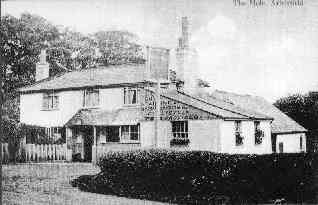
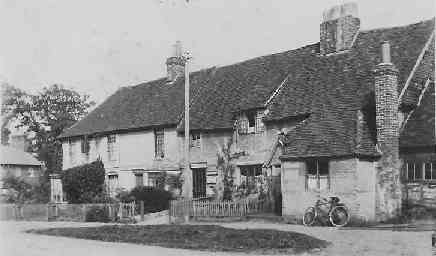
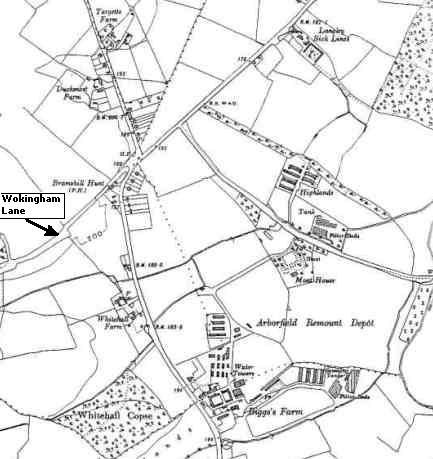
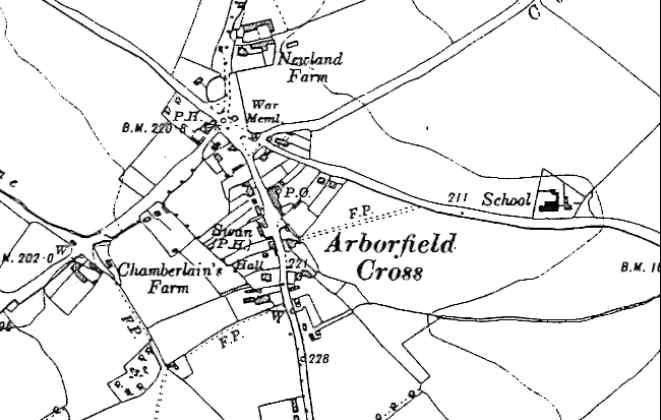 Swan) and drilled in
Mr Isaacs’
field (now the site of the housing estate).
Swan) and drilled in
Mr Isaacs’
field (now the site of the housing estate). 